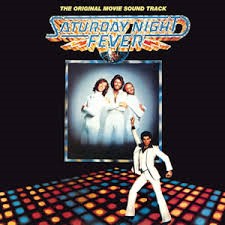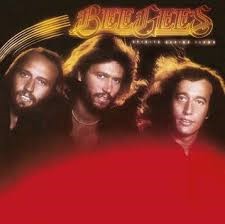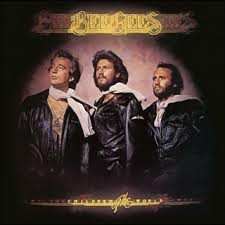- Saturday Night Fever (1977) – While technically a soundtrack, it’s often considered part of their studio discography due to its massive impact. It’s one of the best-selling albums of all time.
- Spirits Having Flown (1979) – This album topped charts worldwide and included hits like “Tragedy” and “Too Much Heaven.”
- Main Course (1975) – This marked their transition into disco and R&B, featuring the hit “Jive Talkin’.
- Children of the World (1976) – Known for the smash hit “You Should Be Dancing.”
- E.S.P. (1987) – Their successful comeback album, featuring the number-one hit “You Win Again.”
1. Saturday Night Fever (1977)

The “Saturday Night Fever” soundtrack, released in 1977, revolutionized the music industry and became a cultural phenomenon. This disco masterpiece not only dominated the charts but also defined an era, selling over 40 million copies worldwide. The album features the Bee Gees at the height of their powers, with their signature falsetto harmonies and infectious dance rhythms. Hits like “Stayin’ Alive,” “Night Fever,” and “How Deep Is Your Love” became instant classics, propelling disco into the mainstream and cementing the Bee Gees’ status as pop icons.
The soundtrack’s success was intrinsically linked to the film’s popularity, creating a symbiotic relationship that elevated both to legendary status. “Saturday Night Fever” not only showcased the Bee Gees’ songwriting prowess but also captured the essence of 70s nightlife and fashion. Its influence extends far beyond its time, continuing to inspire artists and resonate with audiences decades after its release.
2. Spirits Having Flown (1979)

“Spirits Having Flown,” released in 1979, was their triumphant follow-up to their “Saturday Night Fever” success. This chart-topping album solidified their status as disco titans while showcasing their evolving musical prowess. Blending their signature falsetto harmonies with disco beats and R&B influences, the Bee Gees crafted a sound that was both familiar and fresh. The album spawned three number-one hits: “Tragedy,” “Too Much Heaven,” and “Love You Inside Out,” demonstrating the band’s continued commercial appeal.
“Spirits Having Flown” went multi-platinum, selling over 20 million copies worldwide. It represented the peak of the Bee Gees’ disco era, capturing the late 70s zeitgeist while hinting at the musical directions they would explore in the coming decades. Despite the impending backlash against disco, this album stands as a testament to the Gibb brothers’ songwriting skills and their ability to create enduring pop classics.
3. Main Course (1975)

“Main Course,” released in 1975, marked a pivotal moment in their career, signaling their transition into the disco era. This album showcased the group’s evolving sound, blending their pop-rock roots with R&B and funk influences. Produced by Arif Mardin, “Main Course” introduced the Bee Gees’ signature falsetto harmonies and disco beats that would define their future success. The album’s lead single, “Jive Talkin’,” became a chart-topping hit, revitalizing the band’s popularity and paving the way for their disco dominance.
“Main Course” not only demonstrated the Gibb brothers’ versatility as songwriters but also their ability to adapt to changing musical trends. It laid the groundwork for their subsequent disco classics and influenced the direction of pop music in the late 1970s. With its mix of upbeat dance tracks and soulful ballads, “Main Course” remains a crucial album in the Bee Gees’ discography, bridging their earlier work with their disco heyday.
4. Children of the World (1976)

“Children of the World,” released in 1976, solidified their transition into disco superstars. This album built on the R&B and funk influences introduced in “Main Course,” fully embracing the disco sound that would define their career’s most successful period. Produced by the Bee Gees themselves alongside Albhy Galuten and Karl Richardson, the album showcased the group’s evolving musical style and production skills. It featured the chart-topping hit “You Should Be Dancing,” which became an iconic disco anthem and later featured prominently in the film “Saturday Night Fever.”
The album’s blend of catchy melodies, falsetto harmonies, and irresistible dance rhythms helped establish the Bee Gees as leaders of the disco movement. “Children of the World” achieved commercial success, going platinum and setting the stage for the group’s forthcoming mega-success with the “Saturday Night Fever” soundtrack. This album stands as a crucial stepping stone in the Bee Gees’ disco evolution, cementing their place in 1970s pop culture.
5. E.S.P. (1987)

“E.S.P.,” released in 1987, marked a significant comeback for the Bee Gees after a period of relative quiet in the early 1980s. This album showcased the group’s ability to adapt to the changing musical landscape of the late 80s while maintaining their signature sound. Moving away from their disco roots, “E.S.P.” embraced a more contemporary pop-rock style, incorporating elements of adult contemporary and soft rock. The album’s lead single, “You Win Again,” became a massive international hit, topping charts in numerous countries and reigniting interest in the Bee Gees.
Produced by the group alongside Brian Tench, “E.S.P.” demonstrated the Gibb brothers’ enduring songwriting prowess and vocal harmonies. It proved that the Bee Gees could successfully navigate the post-disco era and remain relevant in the ever-evolving music industry. “E.S.P.” not only revitalized the Bee Gees’ career but also introduced their music to a new generation of listeners, solidifying their status as pop music legends.

